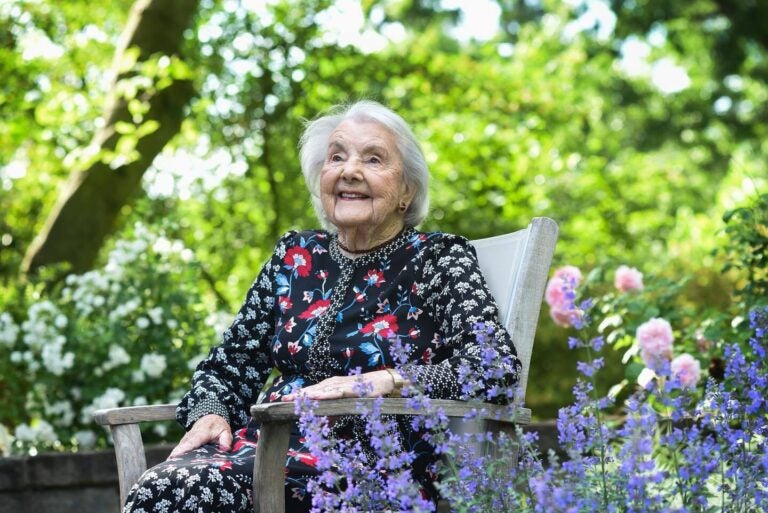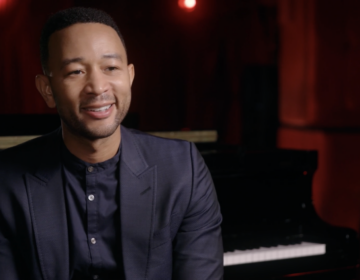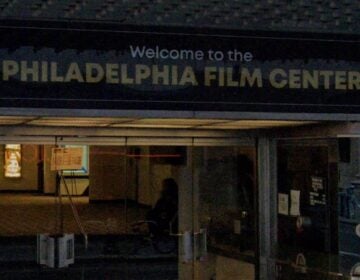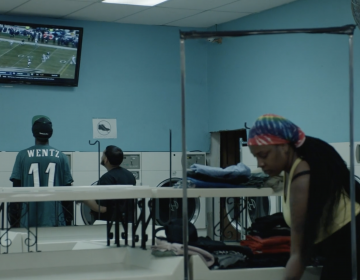Film on Dr. Audrey Evans, CHOP oncologist and founder of Ronald McDonald House, will be screened this weekend
Dr. Audrey Evans is the subject of new biopic “Audrey’s Children,” a film set and shot in Philadelphia and written and produced by Philadelphians.

Portrait of Dr. Audrey Evans. (Courtesy of Philadelphia Film Society)
From Philly and the Pa. suburbs to South Jersey and Delaware, what would you like WHYY News to cover? Let us know!
For many young cancer patients, Dr. Audrey Evans was influential in their survival.
The celebrated pediatric oncologist’s philosophy on family-centered care made parents feel at home at Philadelphia’s Ronald McDonald House, while prioritizing treatment for their children.
Philadelphia-based filmmaker Julia Fisher Farbman, attempted to capture Evans’ life story for the silver screen with her film “Audrey’s Children,” which premiered on Oct. 20 at the Philadelphia Film Festival.
The film follows Evans’ trials and triumphs as a pediatric oncologist at the Children’s Hospital of Philadelphia to her founding of the Ronald McDonald House. The film is featured as part of the festival’s Filmadelphia category — which includes films about Philadelphia and by Philadelphians. Andrew Greenblatt, CEO and Executive Director of the Philadelphia Film Society stressed the importance of this category.
“We don’t do [this festival] for anyone else,” Greenblatt said. “And I think part of that is shining a light on our own city, a positive light on our own city as often as we can, but critical where it needs to be.”
Who was Audrey Evans?
Evans was born in 1925 in York, England, and earned her medical degree in 1953 from the Royal College of Surgeons in Edinburgh, Scotland. She came to the United States as a Fulbright Scholar at Boston Children’s Hospital.
She also worked at the University of Chicago where she was hired as the first chief of pediatric oncology at the Children’s Hospital of Philadelphia in 1969. “Audrey’s Children” opens with Evans wheeling a patient down the halls of the oncology ward at CHOP.
In 1971, Evans developed the Evans Staging System, a method that allowed for aggressive treatments for patients with Neuroblastoma — a cancer affecting the nerve cells most commonly affecting infants and young children. Now a standard of care, chemotherapy was rarely used to treat childhood cancer back then. The film documents her journey in establishing this system of care and her challenges in convincing her colleagues to adopt revolutionary treatment methods for pediatric cancers.
“She was told by male colleagues that it was unethical to give chemotherapy to children,” said Dr. John Maris, professor of pediatric oncology at CHOP and the University of Pennsylvania. “Why poison them when there’s no chance that they would live?”
Pushing for alternative methods of care, while initially risky, paid off for Evans and her patients. During Evans’ time at CHOP, the mortality rate for children with Neuroblastoma dropped 50%.
“She was a major driving force of leading the revolution that changed childhood cancer from being a nearly uniformly fatal disease, to one where we cure 80% of patients,” Maris said.
While improving the lives of her patients was a top priority, Evans saw the strain illness put on entire families. She knew hospital bills could stack up and that many parents slept in the hospital parking lots or hallways to prioritize their children’s medical treatment.
“She always said that a sick child is a sick family,” Susan Campbell, CEO of Ronald McDonald House Charities of the Philadelphia Region said. “And in order to take care of the child, you must take care of the entire family so that everyone can heal together and be supported together.”
Teaming up with the general manager of the Philadelphia Eagles, Jim Murray, Evans envisioned a home where families could stay for free when they traveled to seek care for their sick children. The Ronald McDonald House was founded on October 15, 1974.
Since its inception, Ronald McDonald Houses Charities have opened more than 375 houses worldwide. As the organization continued to expand, Evans’ philosophy remained at the center of its work.
“Her will in understanding what families need is a great example for all of us to learn how we can help impact others,” Susan Campbell said. “And I would encourage people to see ‘Audrey’s Children’. It is inspiring. And it really can help us all realize how we can — that those small acts of kindness can make a big difference in people’s lives.”
The Ronald McDonald House celebrated its 50th anniversary the same week as the global premiere of “Audrey’s Children.”
How Audrey’s Children came to be
Evans was a friend to Farbman’s family and to Farbman, Evans was “magic.” She originally profiled her for Amazon’s “Modern Hero,” released in 2016.
“When we released her video initially just on social media, it got 17 million views and hundreds of thousands of shares and comments from people who were alive because of Audrey, who enrolled in medical school because of Audrey, who were able to stay at the Ronald McDonald House so their children could be treated. And it was because of Audrey,” Farbman said.
The engagement on that video unlocked something deeper within Farbman. She realized Evans deserved to be showcased on a larger scale.
Farbman said Evans was originally skeptical, unsure why anyone would care about her life but agreed to the movie under one condition: that it made a difference in the lives of children. And so, Farbman began to write “Audrey’s Children.”
The process took years as Farbman interviewed Evans extensively about her life. Once Evans was on board, she had ambitious goals for the film.
“If we’re going to do it, then we better do it right. Let’s take this thing all the way to the Oscars,” Farbman recalled Evans saying.
Farbman read the script to Evans many times, making it a collaborative effort. But while the film was in production, Evans passed away in Sep. of 2022. Natalie Dormer from “Game of Thrones” plays Evans. Both Dormer and director Ami Canaan Mann were able to meet the subject of their film before her passing. Evans was also able to watch initial footage.

“She loved it, which was just one of those moments I will never forget,” Farbman said. “And I genuinely believe that Audrey knew in her heart that we got this, that we were gonna carry her legacy in the way that she would want it to be carried.
On opening night, the film received a warm response from a packed room at the Philadelphia Film Center. Friends and fans of Evans turned up to celebrate and remember her. After the screening, organizers hosted a talkback session where audience members shared their memories and thanked the cast and crew for documenting Evans’ life.
“I couldn’t imagine that anybody would be able to capture that. No one. No one could do it better than Audrey,” David Alexander Jenkins, said after the premiere. “I mean, we were all in tears. We couldn’t hold ourselves together because we remembered her voice and we were watching now and thinking, oh my god, that’s Audrey. That’s Audrey. So, I know Audrey’s smiling.”
“Audrey’s Children” will be screened again on the festival’s closing night, Oct. 27, at 8 p.m.

Get daily updates from WHYY News!
WHYY is your source for fact-based, in-depth journalism and information. As a nonprofit organization, we rely on financial support from readers like you. Please give today.




